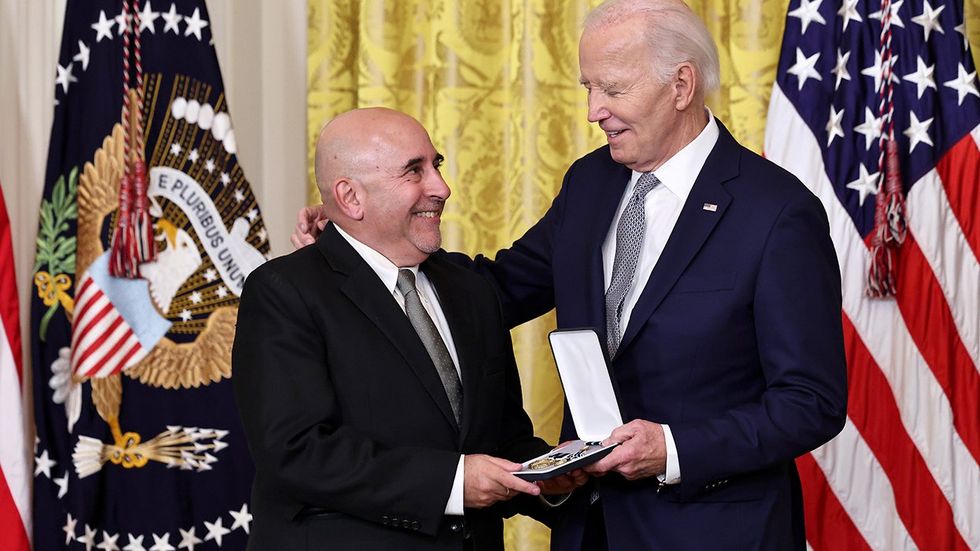Iconic marriage equality activist Evan Wolfson on the future of marriage equality
Today is the 10th anniversary of the U.S. Supreme Court's landmark decision in Obergefell v. Hodges which established marriage equality nationwide. Anyone who is old enough knows that this ruling marked the culmination of decades of advocacy and legal battles for LGBTQ+ rights, and that these rights, and others, should not be taken for granted.That is the main message of marriage activist, attorney, and Presidential Citizens Medal recipient Evan Wolfson, who has been one of the foremost advocates of marriage equality for over 30 years. He founded the organization, Freedom to Marry, and along with countless others, tirelessly worked to shift public opinion and challenge discriminatory laws. Their efforts led to incremental victories in various states, setting the stage for the Supreme Court's decision in Obergefell.Despite the Supreme Court's ruling, some state lawmakers have continued to challenge marriage equality. In at least nine states, measures have been introduced aiming to undermine same-sex couples' right to marry. Notably, five of these measures explicitly urge the Supreme Court to overturn Obergefell.Wolfson told The Advocate that the Supreme Court overturning Obergefell would be "outrageous," but he considers it unlikely. While there are at least two justices who might oppose marriage equality, securing a majority to overturn the decision seems improbable, Wolfson stated, "Whether there are five votes in the Supreme Court seems pretty unlikely at this point, though, again, we don't know. Bad things can happen. Anything can happen, but I don't think that's very likely."In Idaho, the state House of Representatives passed a resolution calling for the Supreme Court to reconsider and overturn Obergefell, advocating for the restoration of marriage as a union exclusively between one man and one woman. Similarly, Michigan state Rep. Josh Schriver introduced a resolution urging the Supreme Court to overturn the 2015 decision, arguing that it conflicts with the sanctity of marriage and the state's constitution.In Oklahoma, lawmakers have introduced bills that, while not directly challenging Obergefell, aim to promote traditional family structures. For example, state Sen. Dusty Deevers proposed the "Promote Child Thriving Act," offering tax credits exclusively to married couples who are the biological parents of a child.Regarding state legislatures passing resolutions urging the Supreme Court to overturn Obergefell, Wolfson described these actions as political maneuvering rather than genuine threats. These resolutions do not have the legal standing to initiate Supreme Court cases. They are more political messaging and stunts than an actual threat," Wolfson said. These measures do indicate the presence of opposition, but they do not pose an immediate legal danger to marriage equality.In 2022, anticipating potential challenges to marriage equality, Congress passed the Respect for Marriage Act. This legislation mandates that any lawful marriage performed in one state must be recognized by all other states and the federal government.Wolfson highlighted this act as a significant safeguard. "We have a sort of a 90 percent safeguard against the, I think, relatively unlikely, bad case scenario ... [of marriage equality being reversed]," he said.Public support for same-sex marriage has grown substantially over the years, but a divide is growing. Overall, a record 88 percent of Democrats supported marriage equality, compared to only 41 percent of Republicans a low not seen since the Obergefell v. Hodges decision, according to a recent poll by Gallup. While 68 percent of Americans support marriage equality, the 47-percentage-point gap between Republicans and Democrats on the issue is the highest recorded since Gallup began polling on the issue of marriage equality in 1996.Wolfson advises against succumbing to anticipatory despair over potential threats to marriage equality. People should focus on current challenges and continue building on the majority support for marriage equality, Wolfson remarked, "Worrying about what might happen is not useful. Recognizing that things are bad right now already and we need to fight it. That's what's useful."




